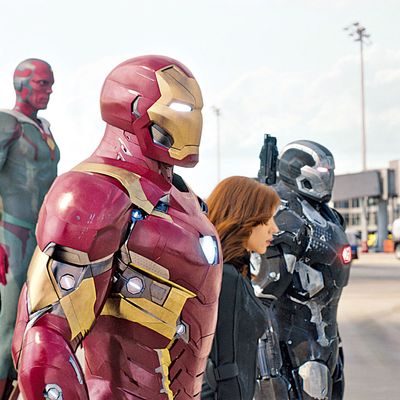
Given the relative dullness of the Marvel supervillains, the studio has resorted to making its colorful superheroes fight one another in Captain America: Civil War, a combination jamboree and ethical colloquium. There’s a lot of bloat, but the fanboy in us all will have a hard time not grinning when Spider-Man be-webs Captain America’s shield while Ant-Man scoots around pulling out wires in Iron Man’s suit.
But there’s a lot of bloat.
The film pivots on citizens enraged by collateral damage, because it turns out that when superheroes throw supervillains into sides of buildings, many people in those buildings die. That danger hadn’t occurred to me, frankly, insofar as superheroes don’t really exist — so who needs pesky real-world consequences? But 9/11 has sensitized us to the horror of collapsing skyscrapers (Americans were the last to get the news), while modern comics writers (along with directors Christopher Nolan and Zack Snyder) have earnestly taken up the ethics of vigilantism. Snyder’s Batman v. Superman: Dawn of Justice opens with Bruce Wayne/Batman watching Superman and General Zod pulverize Metropolis and blaming (inexplicably, given his own leanings) the savior rather than the psycho. Our heroes here are similarly pilloried.
More than pilloried. The secretary of State (William Hurt!) lectures the chastened Avengers for “routinely ignor[ing] sovereign borders” and being “unconcerned” about the hell they leave behind. The United Nations wants them to sign a treaty promising not to fly around smashing invaders willy-nilly. Robert Downey Jr.’s Tony Stark/Iron Man thinks this is a good thing and Steve Rogers/Captain America (Chris Evans) thinks it’s not. I’d guessed the high-tech Stark would be the one to opt for security over accountability, but early on he’s schooled by Alfre Woodard* as a mother whose son died in the last Avengers film. Captain A, on the other hand, consoles a guilt-ridden Wanda Maximoff/Scarlet Witch (Elizabeth Olsen) on the inevitable trade-off: “This job is trying to save as many people as we can,” he says. “Not all of them.” The script puts us on Cap’s side: Safety first. It even features a cute drone.
The politics do get muddled in the end — but who’s lining up for the clunky debates? Captain America: Civil War turns on another of those momentous questions: Who would win in a fight — Batman or Superman? King Kong or Godzilla? Tyrannosaurus Trump or Robo-Hillary? And so Scarlet Witch, Falcon (Anthony Mackie), Hawkeye (Jeremy Renner), and the newly enlisted Ant-Man (Paul Rudd) line up behind Captain A, while War Machine (Don Cheadle), Black Widow (Scarlett Johansson), and Vision (Paul Bettany) side with Iron Man. Spider-Man (Tom Holland) pops up, too. Superheroes can take a lot of punishment and the results are predictably inconclusive. But … you know: Iron Man zapping Captain America bonking Iron Man getting electro-fogged by Scarlet Witch getting kung fu–ed by Black Widow — how cool is that? It’s too bad Hulk and Thor were otherwise engaged and Samuel L. Jackson likely cost too much even for a budget this gargantuan. But there are wild cards, among them Cap’s old pal turned nemesis Bucky Barnes/Winter Soldier (Sebastian Stan) and the African president who moonlights as Black Panther (Chadwick Boseman) and thinks the Winter Soldier killed his dad. On another front, an enigmatic Daniel Bruhl slays former hydra officials in a quest to locate a bunch more bio-enhanced Winter Soldiers in stasis somewhere in the former Soviet Union. It’s a busy, busy movie.
But not an especially inventive one. Say what you will about Zack Snyder, he aims for a mythic palette, mixing Expressionistic silent-film imagery with art-museum-worthy religious iconography. Overseen by ex–sitcom directors Anthony and Joe Russo, Captain America: Civil War is a hodgepodge, with action sequences handled by sundry effects factories working in sundry styles. The most rousing set piece is the very first, a hyperspeed fight between terrorists and a handful of Avengers that’s noticeably rotoscoped, the slight flicker making the real bodies and computer-generated mayhem seem all of a piece — and brilliantly punctuated by the Captain’s pinging shield and the elastic gymnastics of Johansson and her stunt double.
How many gag writers supplied one-liners? I especially liked the bit in the car where the Winter Soldier asks the cranky Falcon to move up his seat. Holland shows promise as the new, unusually juvenile Spidey, a chatterbox full of hormones and grooving on his power. Martin Freeman has a brief but amusingly creepy part as a CIA liaison who’s a little too happy doing his job. Olsen can suffer without being a drip — her mask of grief is eloquent.
The best way to think of Captain America: Civil War is as a toy box in which the sheer quantity of toys partly makes up for the lack of anything new. But the big takeaway is worrisome. Marvel has created a universe teeming with superheroes who simply don’t have enough to do. They’re all suited up with nowhere to go.
*This review originally misidentified the actress Alfre Woodard. We regret the error.
This article appears in the May 2, 2016 issue of New York Magazine.


